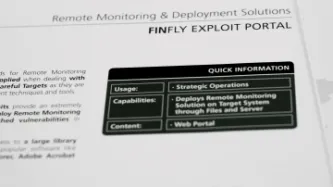Search
Content type: Examples
FullScreen Research claims that in the competitive German food delivery market, Lieferando uses automation to monitor its employees and that Wolt violates labour laws by paying couriers in cash and employing them illegally A former supervisor with Lieferando says that the system flags up abnormalities for a team of watching agents, who see each courier's exact location and are supposed to ask drivers the reason for delays. Lieferando denies that it illegally controls drivers'…
Content type: Examples
German data protection authorities have ruled that the use of Microsoft Office 365 in schools is not compliant with GDPR, citing a lack of transparency around how and where Microsoft processes and stores student data as well as the potential for third-party access. German federal and state data protection authorities have been looking at how to improve Office 365 for two years but deems changes Microsoft has made insufficient to bring the software into compliance.
https://www.computerweekly.…
Content type: Examples
Three days after announcing Germany would adopt the centralised Pan-European Privacy-Preserving Proximity Tracing (PEPP-PT) standard for contact tracing, the country's chancellery minister Helge Braun and health minister Jens Spahn announced they would instead use the decentralised approach backed by Apple, Google, and other European countries. While both standards rely on Bluetooth connections between nearby phones, PEPP-PT would have required Apple's cooperation to implement, and the company…
Content type: Examples
Researchers at Germany's Robert Koch Institute and Fraunhofer Heinrich Hertz Institute are working on an app that uses Bluetooth connections between smartphones and is compliant with GDPR to anonymously save the distance and duration of contact between people on the smartphone to make it possible to digitally reconstruct infection chains. The idea is being copied from Singapore's TraceTogether app, which detects other users who have also installed the app. If someone tests positive, they can…
Content type: Examples
The German mobile operator Deutsche Telekom announced in a press conference on RKI Live that it had passed on, anonymised, its users' movement data to the Robert-Koch Institute to study the extent to which the population would follow the government's restrictions. RKI president Lothar Wieler said this data is also available for purchase, but was given to RKI at no charge.
Source: https://frask.de/coronavirus-deutscher-mobilfunkbetreiber-gibt-bewegungsdaten-weiter/
Content type: News & Analysis
Private surveillance companies selling some of the most intrusive surveillance systems available today are in the business of purchasing security vulnerabilities of widely-used software, and bundling it together with their own intrusion products to provide their customers unprecedented access to a target’s computer and phone.
It's been known for some time that governments, usually at a pricey sum, purchase such exploits, known as zero- and one-day exploits, from security researchers to…
Content type: Press release
A 400 gigabyte trove of internal documents belonging to surveillance company Hacking Team has been released online. Hacking team sells intrusive hacking tools that have allegedly been used by some of the most repressive regimes in the world.
The documents reportedly confirm Hacking Team has customers in 35 countries, including some that routinely abuse human rights. These documents seemingly validate research conducted by Citizen Lab…
Content type: Long Read
Privacy International in October 2014 made a criminal complaint to the National Cyber Crime Unit of the National Crime Agency, urging the immediate investigation of the unlawful surveillance of three Bahraini activists living in the UK by Bahraini authorities using the intrusive malware FinFisher supplied by British company Gamma.
Moosa Abd-Ali Ali, Jaafar Al Hasabi and Saeed Al-Shehabi, three pro-democracy Bahraini activists who were granted asylum in the UK, suffered variously…
Content type: News & Analysis
Last year, UK-based surveillance company Gamma TSE sold the Indonesian military US$ 6.7 million worth of equipment as part of the military's weapons modernisation effort. As early as 2005, Indonesian officials were soliciting the advice of a close partner of Gamma, Germany-based Elaman, to create technical surveillance unit (TSU), according to a white paper published as part of the WikiLeak SpyFiles and found in the Surveillance Industry Index.
Gamma and Elaman are…
Content type: News & Analysis
After two years of pressing the Government to come clean on what, if anything, they are doing to investigate the potentially illegal export of the spyware FinFisher, a ruling today by the Administrative Court in Privacy International’s favour marks a significant turning point in our long-running campaign to bring more transparency and accountability to the surveillance industry.
The High Court slammed Her Majesty’s Revenue and Customs for not disclosing whether it was investigating…
Content type: Press release
After challenging HMRC's blanket refusal to release information about the potentially unlawful export of Gamma International's FinFisher surveillance technology, the court has said that the case should proceed to trial and the grounds of Privacy International's challenge are of public importance.
Privacy International in February filed for judicial review of a decision of HMRC, the body responsible for enforcing export regulations, claiming the department is acting unlawfully in its refusal to…
Content type: Press release
The United Nations General Assembly should approve a new resolution and make clear that indiscriminate surveillance is never consistent with the right to privacy, five human rights organizations said in a November 21, 2013 letter to members of the United Nations General Assembly.
After heated negotiations, the draft resolution on digital privacy initiated by Brazil and Germany emerged on November 21 relatively undamaged, despite efforts by the …
Content type: Press release
Privacy International welcomes the resolution introduced on Friday by Germany and Brazil to the UN General Assembly, affirming the international human right to privacy and its essential nature to the realization of other rights, and condemning mass State surveillance of individuals around the world.
Should the resolution be adopted, it will be the first major statement by a UN body on privacy in 25 years, since General Comment 16 in 1988 by the Human Rights Committee. It is also the first…
Content type: Press release
A complaint filed with the Organisation for Economic Cooperation and Development (OECD) against Gamma International, a UK-based company accused of selling surveillance spyware for governments, will proceed and has been accepted for consideration, the UK National Contact Point (NCP) for the OECD announced.
The decision by the NCP is instrumental in the ongoing campaign to hold surveillance companies accountable for their products and the potential enabling of governments to commit human rights…
Content type: Press release
Privacy International, the European Center for Constitutional and Human Rights, the Bahrain Center for Human Rights, Bahrain Watch and Reporters without Borders filed formal complaints with the Organisation for Economic Cooperation and Development (OECD) in the UK and Germany against two surveillance companies on Friday 1st February. The British and German National Contact Points are being asked to investigate Gamma International and Trovicor respectively with regards to both companies’…
Content type: News & Analysis
Bloomberg reported today that security researchers have identified FinFisher spyware - "one of the world’s best-known and elusive cyber weapons" - in malicious emails sent to Bahraini pro-democracy activists, including a naturalized U.S. citizen who owns gas stations in Alabama, a London-based human rights activist and a British-born economist in Bahrain.
Analysis of the emails by CitizenLab (a project based within the University of Toronto Munk School of Global Affairs) revealed that…
Content type: Press release
The Council of the European Union today reinforced restrictive measures on EU exports to Iran, banning "exports of equipment and software intended for use in the monitoring or interception of internet and telephone communications by the Iranian authorities".
The Council also added 17 people responsible for grave human rights violations to the list of those subject to a travel ban and asset freeze. An existing ban on equipment for use in internal repression was transferred from the sanctions…




